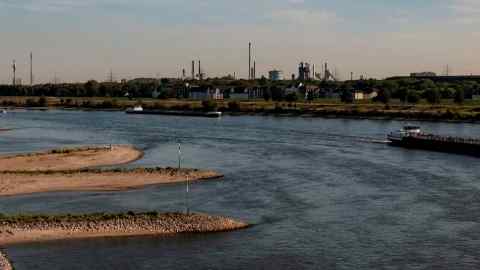
Investors are now more pessimistic about the German economy than at any time since the eurozone debt crisis more than a decade ago, worried that a sharp drop in Russian natural gas supplies and rising of energy prices plunge the country into recession.
The ZEW Institute’s gauge of investor expectations for Europe’s largest economy sank to its lowest level since 2011, falling from minus 53.8 to minus 55.3, underscoring the growing sadness about the economic consequences of Russia’s invasion of Ukraine.
The think tank’s survey of financial market participants provides an early indicator of economic sentiment after Russia reopened the Nord Stream 1 gas pipeline after a maintenance break last month but kept the main conduit for delivery of gas in Europe operating at only one-fifth of its capacity.
Economists have cut their growth estimates in Germany and the wider eurozone this year, while raising their inflation forecasts and warning that an end to Russian energy supplies would force Berlin to ration gas supplies for heavy industrial users.
On Tuesday, German baseload power for delivery next year, the benchmark European price, rose more than 5% to a record 502 euros per megawatt hour, according to the European Energy Exchange. That’s six times higher than the price a year ago, driven up by the cost of the gas used to generate electricity and a prolonged European heat wave that has disrupted generation capacity.
Rising energy prices have pushed up the cost of imports for Germany and other eurozone countries, pushing the bloc’s trade deficit to 24.6 billion euros in June, compared with a surplus of 17.2 billion euros in the same month of the previous year, according to the data. data from Eurostat, the statistical office of the European Commission. The value of the bloc’s exports rose 20.1% in June from a year ago, but imports rose 43.5%.
“The still high increase in consumer prices and the expected additional costs for heating and electricity are currently having a particularly negative impact on the outlook for consumer-related economic sectors,” said Michael Schröder, a researcher at the ZEW.
It said investor sentiment also worsened due to an expected tightening of funding conditions after the European Central Bank raised its deposit rate by 0.5 percentage points to zero in response to record levels of euro zone inflation.
Carsten Brzeski, head of macro research at Dutch bank ING, said the German economy is “rapidly approaching a perfect storm” caused by “high inflation, potential energy supply disruptions and frictions supply in progress”.
A heat wave and drought have reduced water levels in the Rhine below the level at which barges can be fully loaded, restricting important supplies to factories, which Brzeski estimated could drop as much as 0.5 percentage points of German growth this year.
recommended

In addition, German households will have to pay hundreds of euros more in fuel bills this winter after the government announced an additional gas tax of 2.419 cents per KWH from October. This is expected to increase the cost of a family of four by €240 in the last three months of the year.
Germany’s main grid regulator told the Financial Times this month that the country must cut its gas use by a fifth to avoid a crippling shortage this winter. The Ministry of Economy has also ordered all companies and local authorities to reduce the minimum room temperature in their work spaces to 19ºC during the winter.
The country has reached its goal of filling gas storage facilities to three-quarters of capacity two weeks ahead of schedule, after high prices and fuel-saving measures led to a reduction in use. But there are concerns that its goal of raising gas storage to a target of 95 percent of capacity by November will be more difficult if Russia continues to limit supplies.
The German economy stagnated in the second quarter, the weakest performance of the major Eurozone countries. Last month, the IMF cut its forecast for German growth next year by 1.9 percentage points to 0.8%, the biggest cut of any country.
Additional reporting by Harry Dempsey
[ad_2]
Source link


